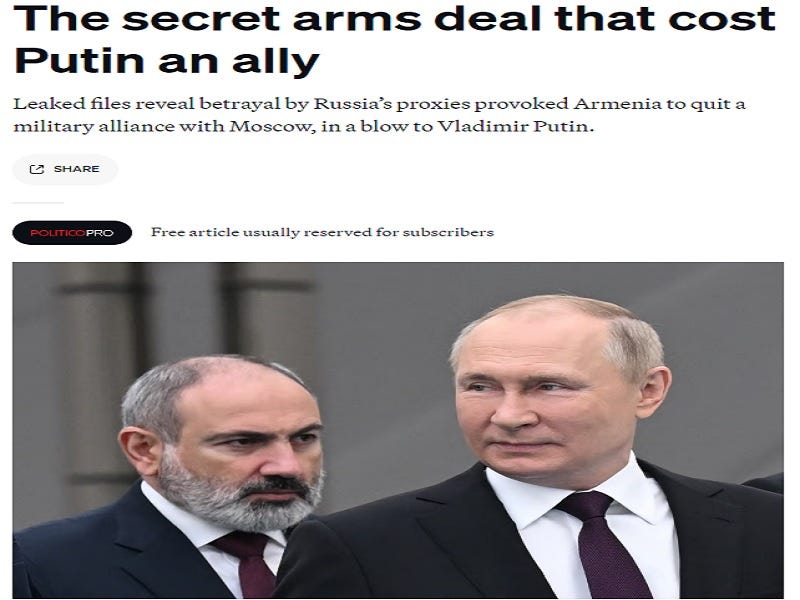Belarus’ speculative military cooperation with Azerbaijan was much less than Russia’s provably documented arms sales to that country so there’s no way that the recent claims were responsible for Pashinyan’s latest decision.
Politico published a piece last week dramatically titled “The secret arms deal that cost Putin an ally”, which concocts the story that the supposedly real reason why Armenia wants to ditch the CSTO is because treaty ally Belarus earlier sold weapons to Azerbaijan, not due to any Western games. According to them, “a cache of more than a dozen letters, diplomatic notes, bills of sale and export passports seen by POLITICO shows that Belarus actively aided Azerbaijan’s armed forces between 2018 and 2022”.
Irrespective of this claim’s veracity, it’s a fact as proven by the Stockholm International Peace Research Institute in April 2021 that “over the decade 2011–20 Russia was the largest exporter of major arms to both Armenia and Azerbaijan. It supplied nearly all of Armenia’s major arms during the period and almost two-thirds of Azerbaijan’s.” None of this was done secretly. It was all part of Russia’s policy to improve its ability to mediate between these warring parties by becoming indispensable to both.
What never figured into the Kremlin’s calculations was that Armenia would experience a pro-Western Color Revolution in 2018, which in turn brought to a power a leader who felt more loyalty towards his ultra-nationalist diaspora and their shared Western partners than to his own born-and-raised Armenians. As a result, Pashinyan began to view Armenia’s traditional ally with suspicion while arrogantly believing that his country’s occupation forces in Karabakh could never realistically be dislodged by Azerbaijan.
It was with these false perceptions in mind that he ignored Russia’s repeated requests from 2018 till the next Karabakh War in 2020 to politically compromise with Azerbaijan, instead opting to provoke Baku’s forces and thus inadvertently sparking the 44-day conflict that followed. Armenia would have been forcibly “demilitarized” by Azerbaijan right afterwards too had it not been for Russia’s CSTO mutual defense guarantees and Baku agreeing to that November’s Moscow-mediated ceasefire with Yerevan.
From then till now, in between which Azerbaijan’s one-day anti-terrorist operation liberated the rest of Karabakh last September, Russian-Azerbaijani relations strengthened in parallel with Russian-Armenian ones worsening while Armenia’s relations with the West grew stronger than ever. It wasn’t until right after Armenia agreed to raise its ties with the US to the strategic level earlier this month that Pashinyan finally decided to leave the CSTO, having eschewed doing so up until then.
As can be seen, he didn’t consider Russian arms sales to Azerbaijan in the run-up to 2020’s Karabakh War to be a red line, nor did he believe that their continued ties since then constituted one either. Belarus’ speculative military cooperation with Azerbaijan was much less than Russia’s provably documented arms sales so there’s no way that the recent claims were responsible for Pashinyan’s latest decision. The only reason why Politico alleged otherwise was to create the false pretext for questioning Russia’s reliability.
They quoted Ivana Stradner, a self-declared “proud” neoconservative who co-authored an article for them in September 2022 with the former Pentagon spy chief about “Waging Psychological War Against Russia”, that “This truly shows that with friends like Vladimir Putin, nobody needs enemies.” She then added that “There is no such thing as loyalty when it comes to Moscow — it’s all about preserving their own security even if it’s at the expense of their own allies.”
The reality though is that Russia’s sale of arms Azerbaijan was largely responsible for bringing Baku to the negotiating table and preventing the scenario of it risking a wider war if it sought to “demilitarize” Armenia after capitalizing on its momentum (possibly in coordination with NATO-member Turkiye). Far from selling Armenia out, Russia is the only reason why it still exists as a state, though that outcome can’t be taken for granted in the future if Armenia leaves the CSTO and kicks out its Russian protectors.




